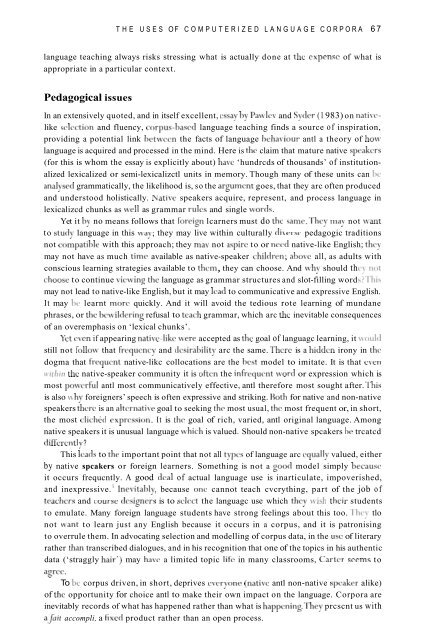Download - Search
Download - Search
Download - Search
Create successful ePaper yourself
Turn your PDF publications into a flip-book with our unique Google optimized e-Paper software.
THE USES OF COMPUTERIZED LANGUAGE CORPORA 67language teaching always risks stressing what is actually done at the expense of what isappropriate in a particular context.Pedagogical issuesIn an extensively quoted, and in itself excellent, essay liy Pa\vlcv and Syder (1 983) on nativclikesclcction and fluency, corpus-liascd language teaching finds a source of inspiration,providing a potential link lietwccn the facts of language Iieliaviour antl a theory of howlanguage is acquired and processed in the mind. Here is the claim that mature native spcikcrs(for this is whom the essay is explicitly about) have ‘hundrcds of thousands’ of institutionalizedlexicalized or semi-lexicalizctl units in memory. Though many of these units can beanalysed grammatically, the likelihood is, so the argumcnt goes, that they arc often producedand understood holistically. Nativc speakers acquire, represent, and process language inlexicalizcd chunks as \\ell as grammar rulcs and single \vords.Yet it hy no means follows that foreign lcarners must do the same.Thcy may not \rantto study language in this way; they may live within culturally tli\ ersc pedagogic traditionsnot compatilile with this approach; they may not aspire to or nccd native-like English; thcymay not have as much time available as native-speaker children; above all, as adults withconscious learning strategies available to them, they can choose. And \vhy should thchoosr to continue vicwing the language as grammar structures and slot-filling wordmay not lead to native-like English, but it may lead to communicative and expressive English.It may be learnt morc quickly. And it will avoid the tedious rote learning of mundanephrases, or the bc\z.ildering refusal to teach grammar, which arc the inevitable consequencesof an overemphasis on ‘lexical chunks’.Yet cvcn if appearing native-likc were accepted as the goal of languagc learning, it \voultlstill not follo\v that frequency and tlcsirability arc the same. Thcre is a hidtlcn irony in thedogma that frequcnt native-likc collocations are the best model to imitate. It is that e\en\i.ithin the native-speaker community it is often the infrequcnt \vortl or expression which ismost pon-cdd antl most communicatively effective, antl therefore most sought after. Thisis also \\ hy foreigners’ speech is often expressive and striking. tbth for native and non-nativespeakers there is an altcrnati\e goal to seeking the most usual, the most frequent or, in short,the most clichktl exprcssion. It is the goal of rich, varied, antl original language. Amongnative speakers it is unusual language kvhich is valued. Should non-native spcakers lie trcatcdtliffercntl y ?This lcatls to the important point that not all types of language arc cquallp valued, eitherby native spcakers or foreign learners. Something is not a good model simply liecauseit occurs frequcntly. A good dcal of actual language use is inarticulate, impoverished,and inexpressive. Inevitably, because onc cannot teach cvcrything, part of the job ofteachcrs and coursc designers is to sclcct the languagc use which they \4.ish their studentsto emulate. Many foreign language students have strong feelings about this too. They tlonot Lvant to learn just any English because it occurs in a corpus, and it is patronisingto overrule them. In advocating selection and modelling of corpus data, in the use of literaryrather than transcribed dialogues, and in his recognition that one of the topics in his authenticdata (‘straggly hair’) may have a limited topic life in many classrooms, Carter seems toagree.To be corpus driven, in short, deprives cvcryone (native antl non-native spcaker alike)of the opportunity for choice antl to make their own impact on the language. Corpora areinevitably records of what has happened rather than what is happcning.They prcscnt us witha,fuit accompli, a fixed product rather than an open process.


